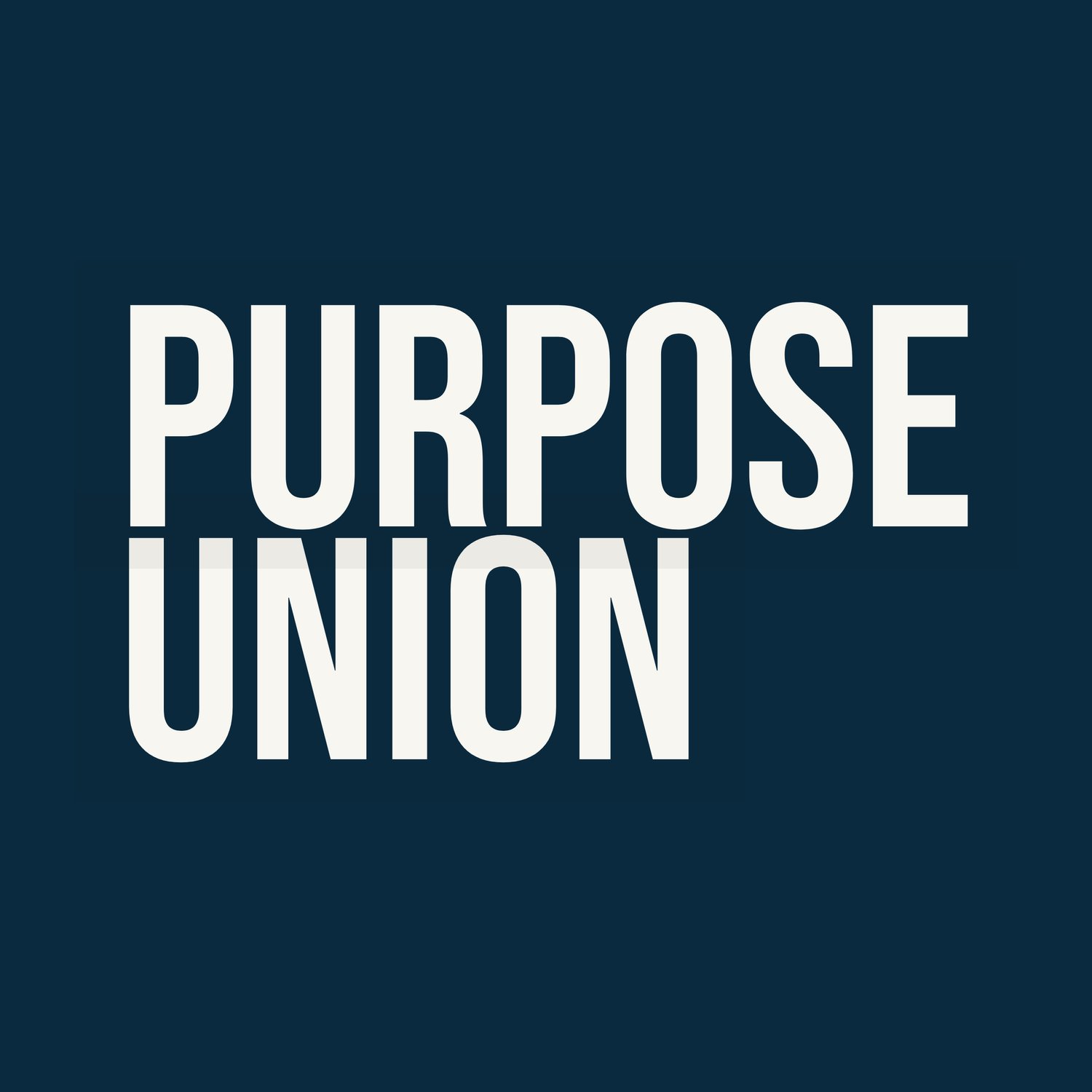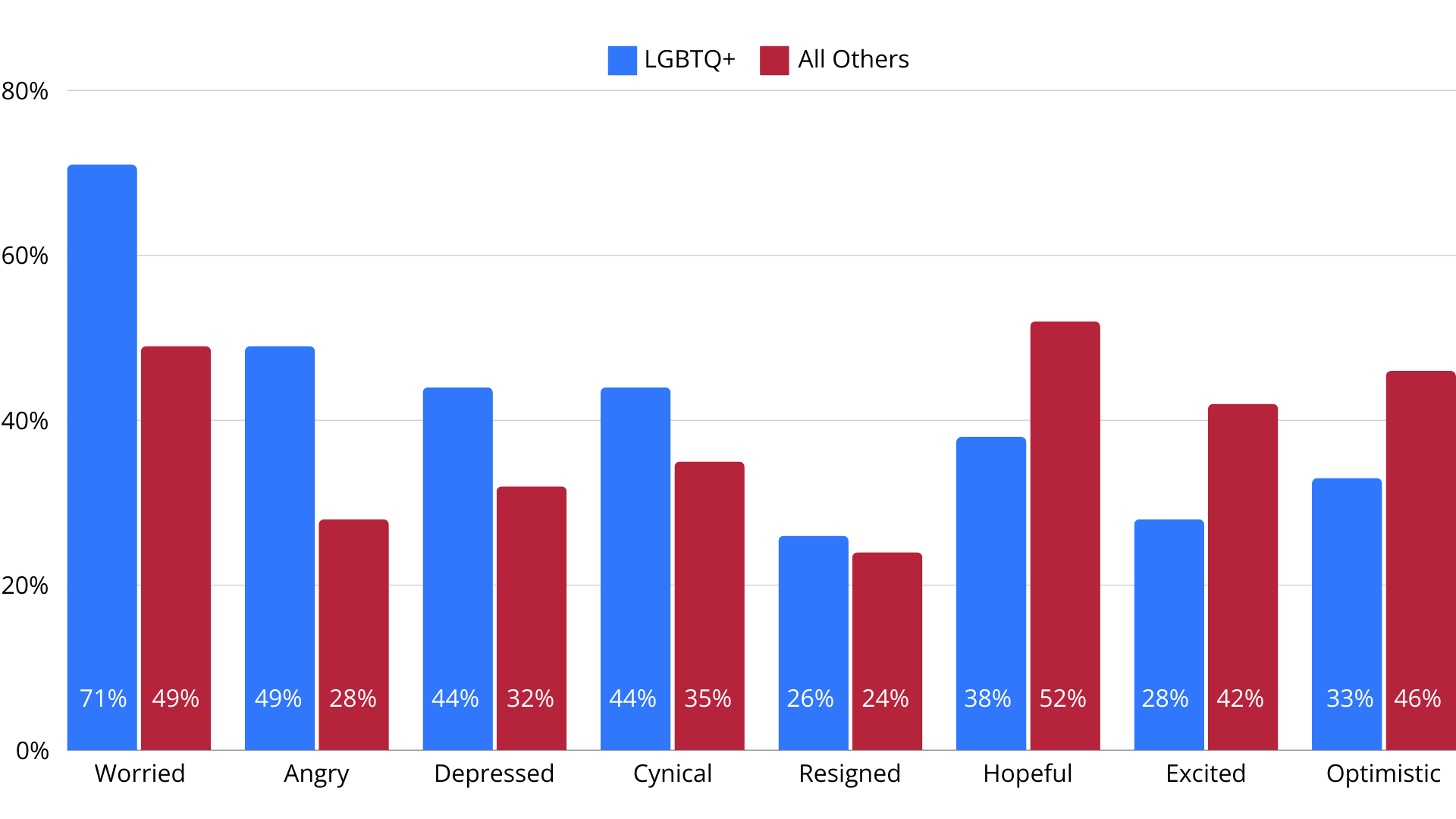LGBTQ+ Gen Z and Millennials: Voices of Hope and Demands for Change
By Patrick Steen, Director at Purpose Union
Our exclusive new Purpose Pulse polling reveals that although the UK’s LGBTQ+ community is worried about the future, they are more willing to speak up about social issues and vote with their feet.
I feel a mood shift in the UK. A changed government. The boy Lionesses’ progress to the Euros final. Is positivity and hope returning? And yet, there are still echoes of unnecessarily provocative commentary from fringe members of the right, with Braverman using ‘monstrous’ in the same sentence as the progress pride flag.
The LGBTQ+ community, of which I am a member, is quite frankly done with being used as a political football. Keir Starmer’s Labour government has an opportunity to turn the page towards empathetic and supportive policymaking. To set a new narrative of belonging, instead of separation. To narrow polarisation by focusing on a simple truth: we’re all human beings trying to get by.
This is evidenced in our latest Purpose Pulse* survey of Gen Z and Millennial audiences - their top concern is the cost of living, no matter their background or characteristics. We’ll release the full report later this summer, so today I’m going to share a snapshot look at what the UK’s LGBTQ+ community is concerned about and how the public and private sectors should support them.
Post-election Pride
One of our most striking findings is the profound sense of pessimism about the future among LGBTQ+ individuals compared to other people. LGBTQ+ individuals are more worried by 22 percentage points, 21 points angrier, and 14 points less hopeful compared to others.
How well do each of the following words characterise your own view of the future?
Is this pervasive sense of dread lifting? Not until we see action. That was the overriding message from the esteemed panel members of our latest The Pivot event: award-winning journalist Zing Tsjeng, drag artist Colin Seymour (Crystal), Elton John AIDS Foundation’s Richard Pyle, and trans performance artist Kaiden Ford.
Each of them shared statements of hope following the 2024 general election, from the opportunity for more inclusive policies to the real prospect of eradicating new AIDS cases. Yet there is still a looming fear that warm words won’t become action. That the persuasiveness of “anti-woke” arguments will attract a passiveness of policy.
It’s the trans community who are taking the brunt of an unnecessarily hostile environment. These are people who often face daily discrimination, and yet they also need to put up with headlines targeting their desire to live authentic lives. Or to use the bathroom. As Kaiden put it strongly during their live poetry reading at our event, “I don’t owe you anything, I was born to run wild.”
The government and businesses should be asking themselves - how can we restore hope by actively supporting and uplifting LGBTQ+ communities?
LGBTQ+ Gen Z and Millennial biggest concerns
How big of a challenge would you say these issues are for your generation?
When asked about their biggest concerns for their generation, the cost of living, economic inequality and job security were pressing concerns for all. Yet the data shows that these issues are even more pronounced for LGBTQ+ individuals. For example, 78% of LGBTQ+ respondents expressed worry about economic inequality, compared to 65% of all others.
Discrimination in hiring, promotion, and workplace culture are issues that still persist for the community, and so companies must not row back their commitment to robust diversity, equity, and inclusion (DEI) policies. In fact, this was pinpointed as a key trust-building act - businesses promoting diversity and inclusion was more likely to build trust with LGBTQ+ people (80% vs 65% for others).
It’s concerning that LGBTQ+ people are more likely to cite mental and emotional health as a significant concern. Perhaps this isn’t surprising considering the struggles young LGBTQ+ people face. And yet, this 13-point gap should also awaken a concerted effort among business leaders to prioritise mental health solutions that are inclusive, accessible, and affirming of LGBTQ+ identities.
The largest disparities in our polling were found in concerns about racial and gender inequalities, with 17-point and 14-point gaps respectively. This highlights that LGBTQ+ people not only recognize the broader struggles of all marginalised groups but also face compounded challenges at the intersection of multiple identities. Addressing these concerns requires an intersectional approach to tackle inequality effectively.
What also piqued my interest is that LGBTQ+ people are also notably more likely to be concerned about climate change (+10 percentage-points). This tells me two things. One, like every other group, they are multi-faceted and able to support multiple issues. This was adeptly illustrated by Colin Seymour during our event - when asked about one change he wanted to see, it was action on the water crisis so that Brits can swim in our rivers and the sea without fear of interacting with sewage. And number two… this is a community of activists and changemakers, who in many ways have been pushed to fight for what’s right. It should be enough for business leaders to not only ask how they are supporting their LGBTQ+ networks, but how they are mobilising them.
Corporate Accountability Matters
What’s your view about what companies are doing about social issues today?
This is a community that has higher expectations of companies when it comes to addressing social issues. The data shows that 69% feel companies are not doing enough, and if a company does something they disagree with, they are not going to watch in silence. They are more likely to inform their peers, sign a petition, and significantly more likely to vote with their feet. 61% of LGBTQ+ people will boycott a brand, compared to 44% of others. That’s a 17-percentage point difference.
So what can businesses and the government learn from this data? Warm words and performative allyship won’t cut it. The LGBTQ+ community is looking for genuine commitment and action in a society that often feels less inclusive than a decade ago. However, there is hope—this is a community ready to speak up on social issues and reward companies that take real action. Are you ready to step up?
Register to be sent the full Purpose Pulse report
Purpose Union combines the power of strategy, communications and creative thinking to build new solutions for DEI, sustainability and advocacy challenges, leading to organisational and community resilience. Want to work with us? Get in touch.
*Purpose Pulse survey of 832 Gen Z and Millennials in the UK aged 16 to 43 carried out by the BRC in April 2024. LGBTQ+ audience group made up of those reporting LGBTQ+ sexuality or gender. All data reported is UK country based. US data will be published in September 2024.



